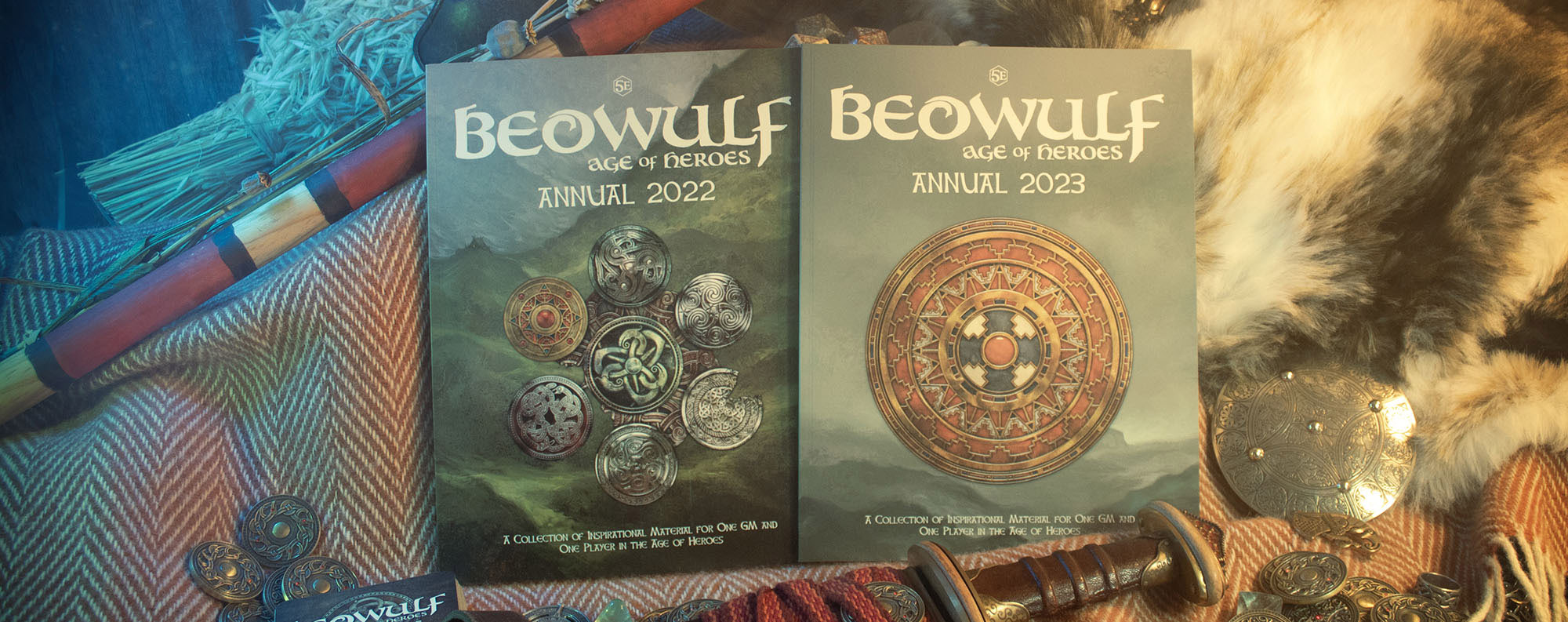What is “Beowulf”? Why is it good? Why are we making a game about it?
About a thousand years ago, the epic story of Beowulf was written down and it has been a source of wonder and inspiration for hundreds of years.

It tells a story of the Migration Period (or “Dark Ages”)— between the fall of the Roman Empire and the rise of the Middle Ages.
In it, Beowulf, a hero of the Geats, travels to Denmark and fights the terrible monster Grendel in King Hrothgar’s hall, tearing off its arm. He must then hunt its mother after she attacks the hall in retribution for Beowulf’s mortal wounding of her son. The poem then tells of Beowulf’s successful turn as a king before he is forced to fight a dragon at the end of his life.
The poem is one of the finest epic poems of its kind, the northern equivalent to the Iliad or The Odyssey.
Beowulf himself is an epic hero, larger than life, with the strength of thirty men and the ability to fight monsters on land and sea with scant weapons or even his bare hands. He sails his ship to wherever there is trouble, leads his band of followers in pursuit of what is right, and busies himself fighting monsters.
Through the poem, we learn of the customs of the Anglo-Saxons, of hospitality and honour, of wide-gabled mead halls and heirloom swords, pattern-welded, bearing ancient names. We learn of the wisdom of kings as gift-givers, and queens as peace-weavers, and how loyalty and bravery are highly prized. It’s amazingly atmospheric stuff, and a genuine glimpse into another world.

In Beowulf’s adventures, we see many elements of the heroic story that can be represented in a roleplaying game to fantastic ends.
After being provided some setting background by the storyteller, we and Beowulf learn that a king and his hall are under threat by a Monster. But Beowulf does not blindly charge forth: he gathers omens and advice from the wise, collects a crew and then asks his own king for permission to fight the Monster.
Given leave, he sails the ocean (and while successful, we learn soon enough about its dangers when Beowulf relates one of his previous adventures). He then presents himself to the king, learns the history of the hall and its people and faces down the Monster, having guessed correctly its only weakness.
This is the perfect material for a one-GM, one-Player RPG.

Aside from the exciting adventure story, a fascinating part of how the tale is written is the clear struggle between two contemporary forces: the doomed ‘pagan’ hero who dies a glorious, song-worthy death fighting monsters, speaks to the melancholy Northern pagan tradition of inevitable doom. Meanwhile numerous passages in the poem, clearly additions to an older tale, promise hope, and rewards after death for those faithful to the new, in-coming ways of the church. That monsters can be overcome by the righteous, and death is not inevitable.
The poem Beowulf evokes an incredibly atmospheric and rich period in history, when the world of Northern Europe was subject to great change. The language of the poem tells us as much of the mindset of the people it was written for as do the events described. It’s an incredible work, which we see reflected in so many other works that came after.

For uncounted years, Beowulf has thrilled readers and inspired authors of fantastic fiction. There are numerous versions available — from the array of public domain versions we are fond of Grummere’s version as well as the translation by William Morris and A. J. Wyatt. But more recent translations have their own features to recommend them, especially the lyrical beauty of Seamus Heaney’s work and the scholarly thoroughness of Tolkien’s translation.
BEOWULF: Age of Heroes is coming soon to Kickstarter. You can check out the system by downloading our free preview, the Hermit’s Sanctuary at drivethrurpg.com


